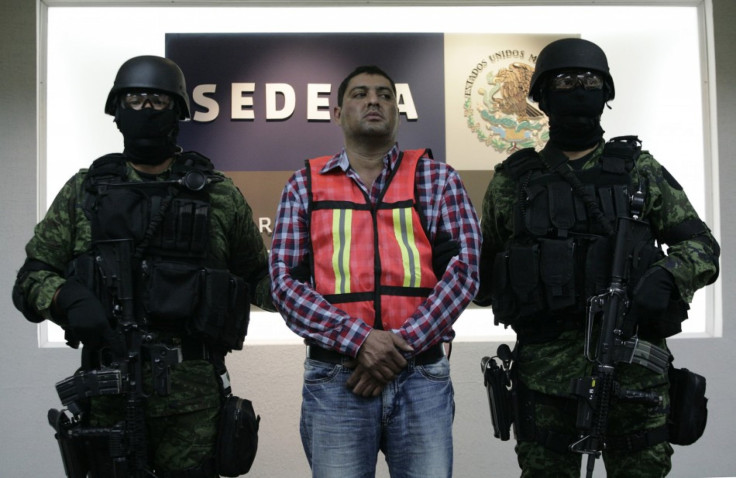How the Arrest of Zetas Lieutenant Changes Mexico's Drug War
ANALYSIS

The Mexican army paraded captured Los Zetas boss Carlos Oliva Castillo, nicknamed The Frog, in front of the media on Thursday, proudly displaying their latest victory in the country's ongoing war on drugs.
Oliva Castillo, said to be the number three man in the powerful Zetas cartel, was captured Wednesday during an hours-long shoot out in the northern city of Saltillo. The drug lieutenant wasn't formally charged, but the army said that Oliva Castillo personally ordered the Monterrey casino arson that killed 52 people in August.
Los Zetas is considered to be Mexico's second most powerful drug cartel. It is also one of the deadliest. The U.S. Drug Enforcement Administration called the Zetas the most technologically advanced, sophisticated and violent of these paramilitary enforcement groups in Mexico, and the way the gang trains its members has been compared to Green Beret training in the United States.
In fact, Los Zetas was founded by ex-Mexican special forces soldiers, and a number of its members are former Guatelmalan Kaibiles, a special operations unit known for its brutal effectiveness. The Kaibiles fought in Guatemala's decades long civil war and have been deemed culpable of the 1982 Dos Erres massacre, during which 200 villagers were murdered.
While Los Zetas traffics drugs from South America into the United States, the gang is more than a drug cartel and is often considered a paramilitary group. Like most guerrilla armies, Los Zetas, as well as Mexico's other powerful cartels, drastically challenges the country's political and social stability.
Oliva Castillo headed Los Zetas' operations in the states of Coahuila, Nuevo Leon and Tamaulipas, where the gang first started in 1999, according to CNN. As third in command, he reports only to Heriberto Lazcano, the Los Zetas boss with a $5 million bounty on his head, and Miguel Treviño Morales, the gatekeeper of Nuevo Laredo.
Oliva Castillo's girlfriend and his bodyguard Juan Carlos Garza Rodriguez were also arrested on Wednesday. State police also seized two rifles, two handguns,ten pounds of marijuana, an armored vehicle and communications gear, according to Fox News Los Angeles.
Mexican authorities take great pride in displaying cartel arrests to the public, just as drug cartels display mutilated bodies as a warning to the public. President Felipe Calderon made stopping the drug trade a top priority when he took office in 2006, but since he began his crackdown, more than 44,000 people have been killed in an unprecedented wave of violence.
Nonetheless, Oliva Castillo's is just the latest in a string of high-profile arrests, and Mexican police has detained lieutenants and bosses from the La Linea, La Familia, Mano con Ojos and Gente Nueva cartels, as well as other Zetas.
Still, Calderon is hardly winning the war on drugs, and bodies are discovered on city streets nearly everyday. In the past two months, drug cartels have kidnapped and assassinated a loyal mayor, a senator, a number of journalists, bloggers and citizens. Additionally, Los Zetas are infamous for killing migrant workers and burying them in mass graves.
In the town of Ascension, Mexico, the entire police force quit after two officers were murdered, choosing to leave their jobs as the town's protectors instead of facing the Sinaloa Cartel. At least the police officers weren't under Sinaloa's control, like many are in Mexico, preferring brides and kick-backs to retaliation.
A July report that found that more than 400 police officers and investigators nationwide had been fired over corruption allegations.
Calderon is prepared to continue on with his current strategy, confident that enough force will end the cartel's reign.
The armed forces are not part of the problem, but part of the solution, Calderon said in September. If we hadn't done anything, instead of the utopian country some think we would live in, we'd be overtaken by the cartels.
© Copyright IBTimes 2024. All rights reserved.





















